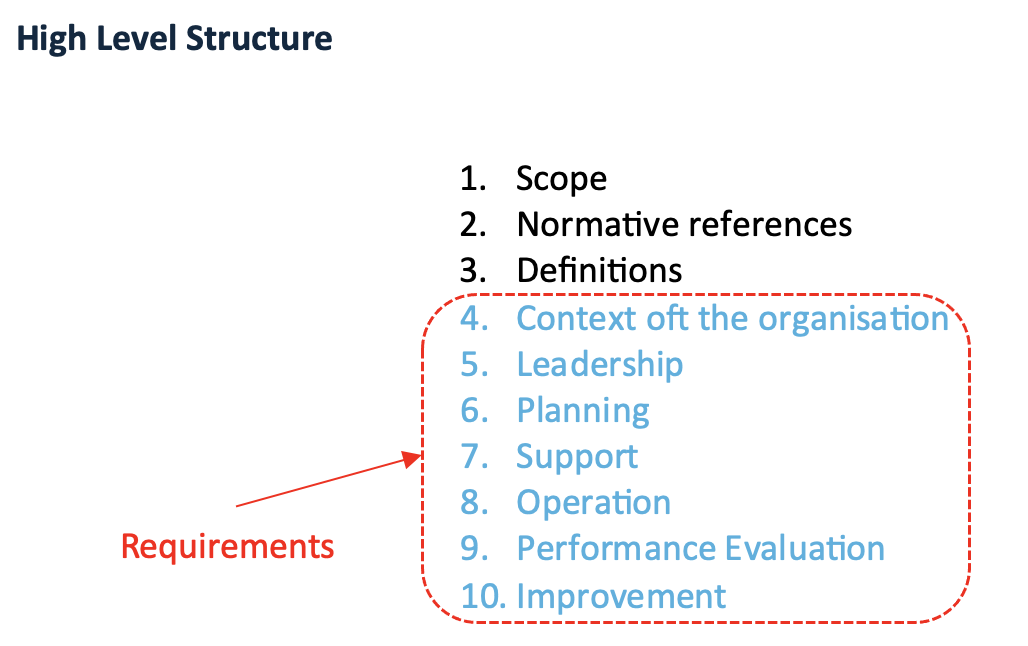
Optimize your management systems by integrating them
The management system standards ISO 9001, ISO 14001, ISO 45001 and ISO 50001 are often set up separately from each other and are each regulated and operated in isolation.
The identical basic structure of these standards (“high level structure”) means that they can be structured in an integrated manner.
By combining the systems in this way, a lot of duplication of effort can be avoided.As the various management systems are not usually set up at the same time, the requirements of the respective standard must be incorporated into the existing regulations.

Key similarities between ISO 9001, ISO 14001, ISO 45001 and ISO 45001:
Benefits/savings through an integrated management system (IMS):
Questions?
We are happy to support you with the integrated implementation of your management systems.
With more than 20 years of experience in setting up and auditing management systems, we are the perfect partner for you.
Other management systems that we can support you in setting up
ISO 37301 – Compliance management systems
ISO 37301 is an international standard that specifies requirements for compliance management systems (CMS). It replaced the non-certifiable ISO 19600 in 2021. ISO 37301 defines requirements for the establishment, development, implementation, evaluation, maintenance and improvement of an effective compliance management system within an organization. In terms of content, the new ISO 37301 hardly differs from the previous requirements of ISO 19600. Only minor editorial improvements have been made.
ISO 37301 follows the same structure as ISO 9001, ISO 14001 or ISO 45001 and therefore makes it possible to integrate all management systems. The requirements of ISO 37301 are about an effective system for complying with the legal and compliance requirements applicable to an organization. To this end, the relevant requirements must be determined, compliance with them must be ensured by means of a regulated organizational structure and process organization, and the relevant system must be continuously improved.
An implemented or certified CMS offers the following advantages, among others:
ISO 37001 – Anti-Corruption Management (Anti Bribery Management)
ISO 37001 specifies the requirements for setting up, implementing and maintaining an anti-corruption management system.
The standard contains a risk-based approach and is also based on the high-level structure, so that it can be easily integrated into existing management systems. The basis for implementing ISO 37001 is a functioning compliance management system.
ISO 26000 and ONR 192500
The two standards ISO 26000 and ONR 192500 define requirements for social and societal responsibility in companies. Both standards can also be incorporated into an integrated management system.
While ISO 26000 is a non-certifiable standard, it is possible to be certified in accordance with ONR 192500.
EFB – Specialist waste management company
An EFB certification can be obtained by any company that disposes of, removes, treats or recycles waste and represents proof of reputable waste treatment and disposal. The rules for obtaining a certificate as a specialist waste management company are published by the Association for the Award of a Specialist Waste Management Company (V-EFB). The requirements for an EFB are defined in the EFB checklist. The relevant documents and the certified companies can be found on the V-EFB website. EFB certification has become the standard in the waste industry. It is usually required as a mandatory criterion in public tenders in particular.
Essential EFB requirements:
Our offer
We support you in the implementation of various management systems or their integration into existing management systems in your company.
Our more than 20 years of experience in setting up and auditing management systems enables us to precisely identify your requirements and adapt your management system to your individual needs.
Integration of other materials into a management system
An integrated management system does not always have to be about certified standards. In addition to the various standard requirements, it is generally very expedient to integrate other matters/obligations of the company into the management system. As a result, such obligations are also systematically regulated and managed and thus virtually raised to a higher level.
Examples include the requirements of the EU Supply Chain Directive, risk management, marketing processes and financial management.

